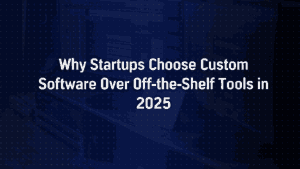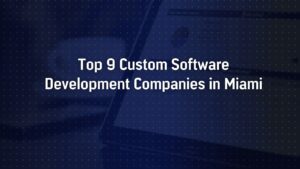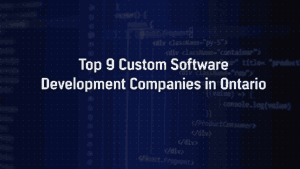Enterprise organizations today face a paradox: almost every executive sees AI as crucial for competitive advantage, yet many still build or buy custom software rather than rely solely on packaged SaaS or AI tools. The reason is simple: off-the-shelf solutions often lack the depth, flexibility, and integration capabilities that complex enterprises demand.
CIOs and IT managers know that generic AI platforms and SaaS apps can’t easily bend to unique business processes, legacy constraints, or stringent compliance rules. In practice, enterprises investing in custom development gain stronger data control, better security, and a future-proof architecture that off-the-shelf tools cannot match.
Off-the-Shelf vs Custom: The Pitfalls of Generic Software
Many packaged SaaS products promise quick ROI but come with inherent limitations. In the AI era, these platforms rarely adapt to specialized, AI-driven workflows. Off-the-shelf tools are built to serve broad markets, not an individual company’s complex needs.
CIOs find that SaaS systems force them to fit processes into rigid, predefined workflows instead of the other way around. Crucially, cloud vendors control data storage, privacy, and updates, leaving enterprises with less control over ownership and compliance.
As one industry analyst notes, “in today’s AI-driven world, many platforms can’t keep up [with] offering control over data privacy, ownership, and governance”. This inflexibility pushes organizations toward custom solutions where every aspect, from data handling to feature logic, is designed for their exact needs.
Key differences between custom enterprise software and generic SaaS solutions. Custom systems are built around existing processes and offer unlimited customization and data ownership, whereas SaaS provides quick deployment at the cost of flexibility.
Legacy Systems: A Barrier to Off-the-Shelf Solutions
Most large enterprises still run a mix of old and new technologies. A 2024 survey found 64% of organizations rely on legacy platforms for at least a quarter of their systems, and many of those systems can’t even connect to modern AI tools. These “languishing” legacy systems carry hidden costs: security holes, integration headaches, and technical debt.
Experts report that outdated, disconnected infrastructure is a common barrier to innovation and compliance. For example, legacy codebases often lack basic security features, making them vulnerable to breaches, and require manual patching, IT teams spend over 16 hours a week just updating old systems. Integrating new AI or cloud services on top of this brittle foundation can be prohibitively complex and risky.
Integration complexity: Legacy applications are typically tightly coupled and use obsolete technologies. Replacing or extending them requires massive effort, and off-the-shelf tools often can’t plug directly into these old architectures .
Regulatory and security risks: Old systems were not built to meet modern regulations (GDPR, HIPAA, SOX, etc.). By themselves, they lack scalability and audit features, making compliance painful. In practice, many businesses report that “disconnected technology and legacy systems are 10 one of the most common barriers to compliance success”.
Technical debt: A majority of enterprises feel hindered by technical debt. One survey found 63% cite serious negative effects from outdated tech on their AI initiatives. Consequently, over half of companies are budgeting large-scale legacy upgrades just to enable AI, 57% plan to update up to 50% of their legacy stack for this purpose.
Because off-the-shelf tools cannot magically replace or modernize these core systems, enterprises often choose custom development. Custom engineering can wrap new interfaces around old engines, systematically migrate data, or even use generative integration to securely link legacy and cloud, something no pure SaaS app can do alone.
Compliance and Regulation Demand Customization
Enterprises in regulated industries routinely hit the limits of generic software. Standard solutions simply cannot cover every specific legal and compliance requirement out of the box. Analysts note that sectors like finance, healthcare, and government “often prefer custom-built software” precisely because standardized SaaS can’t fully address strict rules.
For example, financial firms may need granular audit trails, encryption, or on-premise data storage that only tailored software can guarantee. Similarly, multinational corporations face complex data residency and privacy mandates that vary by country, a situation where full control of a custom environment is invaluable.
Custom development lets IT architects bake regulatory controls and security policies directly into the code. In the AI era, this control is even more critical: enterprises don’t want valuable or sensitive data processed on a shared cloud platform. Instead, they build bespoke solutions where “you control the environment rather than depending on a SaaS provider’s shared platform,” greatly simplifying compliance efforts.
Unique compliance requirements: Custom software can be designed for industry-specific regulations (e.g., HIPAA for healthcare, PCI-DSS for payments) that off-the-shelf systems only partially cover.
Security and data ownership: When data privacy is paramount, owning the software stack is a strategic advantage. Enterprises report feeling more secure with custom apps, as they dictate encryption standards and patching schedules.
These governance needs help explain why mature organizations stick with in-house or custom systems even as they adopt AI: they cannot hand their crown jewels to a black-box SaaS provider.
Flexibility, Scalability, and Future-Proofing
A key reason CIOs opt for custom software is future-proofing. Business needs evolve rapidly, and off-the-shelf products can’t pivot on a dime.
By contrast, custom solutions are inherently flexible and scalable. Industry experts emphasize that bespoke applications have “key characteristics of flexibility, scalability, and adaptability.”, they can evolve alongside a business, adding new features and modules as requirements change .
This means an enterprise can start with a core function and iteratively extend the software (for example, integrating a new AI analytics engine next quarter) without rewriting everything.
Unlimited customization: Custom software offers “unlimited customization potential, complete data ownership, [and] seamless integration” with existing systems. You aren’t stuck with someone else’s roadmap or forced to disable unused features.
Designed for growth: Custom applications can be architected from day one to handle enterprise scale and concurrency. As the workload grows, the code can be optimized or re-architected rather than just paying ever-higher subscription fees for a SaaS tier.
Higher ROI over time: Research shows this pays off: Gartner data suggests businesses implementing custom solutions see an average 55% ROI over five years, versus 42% for SaaS implementations. In other words, paying upfront for exactly what you need (and nothing you don’t) often beats paying annually for a bloated package with unused modules.
In short, custom development doesn’t just solve today’s problems; it builds in agility for tomorrow’s challenges. CIOs can be confident that their systems can absorb new AI capabilities, new data sources, or even new lines of business without a platform lock-in.
Empyreal Infotech: Mastering Enterprise Complexity
When the project scope is truly enterprise-grade, finding the right development partner is critical. Empyreal Infotech has positioned itself as a specialist in exactly this space.
Their teams of 50+ in-house developers provide end-to-end solutions “for startups to enterprises across the globe,” capable of taking projects “from a simple static business website to complex software solutions”.
For enterprise clients, Empyreal emphasizes deep technical expertise: their mobile and app development teams “provide the in-depth technical expertise required for large-scale and multi-disciplinary … projects,” yielding a cited “99% success level of expertise” through agile global processes.
In practice, Empyreal handles the details that matter to CIOs. They highlight key benefits of their approach: cost savings through efficient processes, secure development practices by design, and intrinsic flexibility and scalability to adjust resource levels or features as needed.
In their words, custom development “helps meet all required needs in a cost-efficient way” with software that can be “maintained and modified easily”. For clients, this means getting a tailored solution that fully integrates with legacy systems, upholds compliance, and can grow, all while being backed by a vendor who knows enterprise-grade demands.
Key Advantages Empyreal Infotech Offers:
-
- End-to-end custom development (web, mobile, cloud) by senior engineers.
-
- Agile project management with global processes and proven success rates.
-
- Focus on security and compliance built into the SDLC.
-
- Transparent costing: no surprise fees, only the custom features you need.
-
- Seamless scaling: teams and infrastructure can grow with the enterprise’s needs.
This combination of technical depth and enterprise experience makes Empyreal a trusted partner for CIOs tackling complex modernization and AI initiatives.
Integrating AI into Custom Enterprise Solutions
Finally, custom software offers the clearest path to “AI readiness” in an enterprise. As one analyst puts it, “when AI adds complexity, flexibility becomes critical.” Platforms that allow connecting AI/ML models directly into business workflows are transformative.
For example, modern low-code and custom platforms (like Claris FileMaker, Dockerized microservices, etc.) let developers “design apps that connect with AI models, automate decisions, and blend easily with existing systems.” The result is software where dashboards, reports, or UI elements call predictive algorithms in real time, driving smarter automation.
In AI-driven enterprises, custom applications can incorporate machine learning anreal-time analytics. Bespoke systems allow direct embedding of AI models into workflows, under full IT control .
Because the custom codebase is under the company’s control, IT managers can enforce security and compliance even as they add neural nets or NLP features. They can iterate quickly, spinning up prototypes in weeks, not years, to pilot new AI capabilities.
And if regulations change or new data privacy rules emerge, those can be coded in at the system level. In other words, custom enterprise apps turn AI from a “black box” into a controllable building block of the architecture.
In practice, this means a retailer can plug an AI-powered recommendation engine into its custom e-commerce platform without exposing customer data to external vendors. A bank can deploy custom risk models in-house, ensuring all credit decisions remain auditable.
A manufacturer can integrate predictive maintenance AI directly into its legacy control systems. These are exactly the scenarios driving today’s CIOs to invest in custom software, even with generic AI tools available on the market.
Conclusion
In the AI era, the imperative for custom software in enterprises is stronger than ever. Generic SaaS can never fully match the control, integration, and adaptability that large organizations need, especially when legacy systems and regulatory compliance are at stake .
Custom development frees companies from “one-size-fits-all” constraints, enabling higher ROI, faster innovation, and stronger data governance.
For CIOs and IT leaders, the message is clear: solving today’s AI, legacy, and security challenges often requires a tailor-made approach. Partners like Empyreal Infotech bring the technical depth and agile processes to handle that complexity. Their teams know how to modernize legacy platforms, embed AI smartly, and build truly enterprise-grade systems that meet compliance demands. In short, they ensure your custom solution is ready for the future, AI, and beyond




